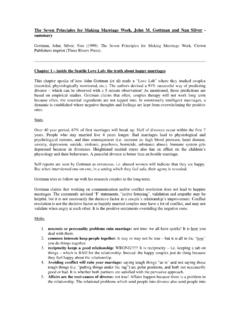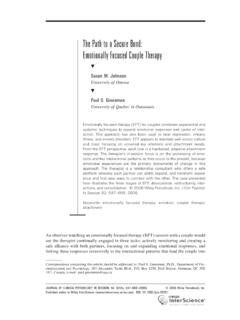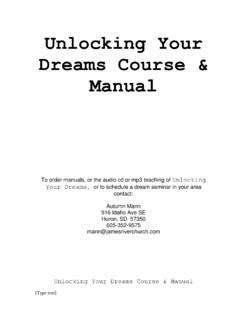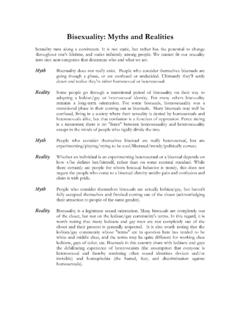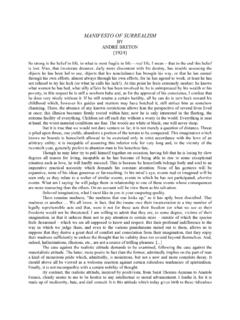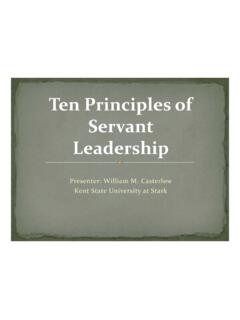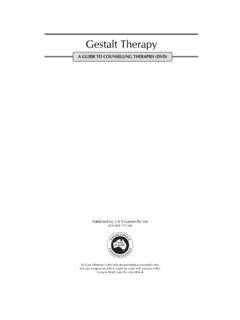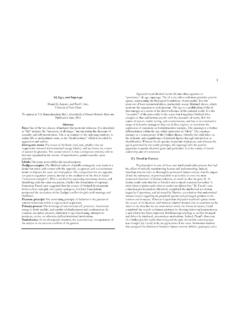Transcription of ASSESSMENT AND FEEDBACK SESSIONS
1 The Gottman Relationship Checkup | 206-523-9042 | | AND FEEDBACK SESSIONS : How to Deliver an Effective FEEDBACK Session to Your Couples The information below is presented to help you assess and provide FEEDBACK to your couples. The Gottman Relationship Checkup website was designed from Drs. John and Julie Gott-man s Sound Relationship House Theory and is based on over four decades of research with more than 3,000 couples. Below is a brief summary of the Gottman Method Couples Therapy ASSESSMENT process and the levels of the Sound Relationship House (SRH) that are covered in the FEEDBACK Session. ASSESSMENT Session 1: Initial Couples Session The first ASSESSMENT session consists of three areas: the couple s narrative, an Oral History Interview, and observing the couple briefly discuss an area of conflict.
2 Begin by outlining the ASSESSMENT process. Then elicit from the couple their narrative explanation of why they re coming to therapy ( What brings you here today? ), how they view their problems, and what their goals are. Following this discussion, conduct an Oral History Interview ( How did you meet? First Impressions, Major Life Transitions, etc.). Then ask the couple to discuss a prob-lem with each other for 10 minutes while you observe them like a fly on the wall. The pur-pose of this is to get an idea of how the couple processes conflict. At the end of the session, give the Gottman Relationship Checkup overview document (available in the Resources tab) and review it with them.
3 Explain that you will be inviting them to take the online Gottman Relationship Checkup, a confidential clinical tool that will help you evaluate their relational strengths and challenges. For a complete explanation of this first ASSESSMENT session, please refer to the Gottman Method Couples Therapy Level 1 or Level 2 clinical training manuals. ASSESSMENT Session 2: Individual SESSIONS The therapist next meets with each partner individually. The session time can be divided into two parts, half for each partner, or the half- SESSIONS can be scheduled at different times. The individual SESSIONS are used to build trust with each individual and learn more about each partner s perspective, family-of-origin, history, possible co-morbidities, hopes, expecta-tions, and commitment to the relationship.
4 Session 3: The FEEDBACK Session In this session, review your ASSESSMENT findings verbally with your couple. Formulate your FEEDBACK by integrating the information you learned from their Narrative, Oral History Interview, Conflict Discussion, Individual SESSIONS , and the Relationship Checkup question-naires. Give the couple a copy of the Sound Relationship House (available in the Resources tab). Tell them you re going to provide FEEDBACK about their relationship strengths and areas needing improvement. We recommend following each of these steps for an effective FEEDBACK Session: 1. Establish a trusting alliance with each person. 2. Engage both partners in the process (be dynamic & interactive vs.)
5 Lecturing). 3. Give the couple a copy of the Sound Relationship House handout. 4. Define each level of the Sound Relationship House, one at a time (see SRH Summary The Gottman Relationship Checkup | 206-523-9042 | | levels below). 5. Tell the couple how their relationship is doing on that level. Is this level a strength or a challenge? Don t criticize or single one individual out. You can say, the relationship is struggling with this vs. identifying one partner as having the problem. 6. Do not give them a copy of the Relationship Checkup analysis or their numerical scores. The Checkup analysis is designed for therapists to use in the context of all the other information learned about a couple during the ASSESSMENT process.
6 In addition, providing a copy would reveal each person s responses, violating the privacy implied by having each person create their own password protected account when answering the questions and it would be counter to the statement on the information sheet that states, your therapist will be the only person to see your responses. 7. Give them hope and understanding and be empathetic. On levels of the Sound Relationship House where the couple is weak, tell them you have exercises and tools designed to strengthen those areas. 8. Talk about what your goals are for the therapy and the order in which you d like to proceed should they decide to continue with treatment.
7 9. Ask more questions to get their reactions to what you re saying. Does the FEEDBACK fit and make sense to them? Ask if they have any additional goals they d like to focus on so that you can incorporate those into the treatment plan. Ask if you missed anything important. Below is a summary of each level of the Sound Relationship House to help you de-scribe it during the FEEDBACK Session Build Love Maps The first three levels of the Sound Relationship House (SRH) constitute friendship, the foun-dation of a strong relationship. The first level of the house is Love Maps. This entails how well you know one another how well you know your partner s inner psychological world, his or her worries, stresses, joys, and dreams .
8 It involves asking open-ended questions and maintaining awareness of your partner s world. Share Fondness and Admiration The second level of the house is Fondness and Admiration, which is the antidote for con-tempt. It involves changing a habit of mind from scanning the environment for your part-ner s mistakes and then correcting them, to scanning the environment for what your partner is doing right and building a culture of appreciation, fondness, affection and respect. Turn Towards Instead of Away The third level is Turn Towards vs. Turning away in everyday moments. The small moments of everyday life are actually the building blocks of a relationship.
9 A partner has the opportu-nity to either turn towards, turn away, or turn against a bid from his or her partner. A bid is a gesture verbal or nonverbal for some sort of positive connection: conversation, humor, affection, or support. The very small everyday moments in a relationship are opportuni-ties opportunities for Turning Towards one another. Accept bids for emotional connection and make deposits into the Emotional Bank Account. The Gottman Relationship Checkup | 206-523-9042 | | a Positive Perspective The first three levels determine whether this level is positive or negative. A positive perspec-tive occurs when friendship is strong.
10 This level represents what it feels like in the rela-tionship. Whether this level is positive or negative determines a lot of things, including the presence of positive affect in problem-solving discussions and the success of repair attempts during conflict resolution. If the first three levels of the Sound Relationship House are not working, then couples tend to be in a negative perspective and are hypervigilant for negativ-ity. People are in negative perspective for a good reason: they see their partner as an adver-sary, not a friend. To change that state, you need to build the friendship in your relationship, using the first three levels of the Sound Relationship House.
